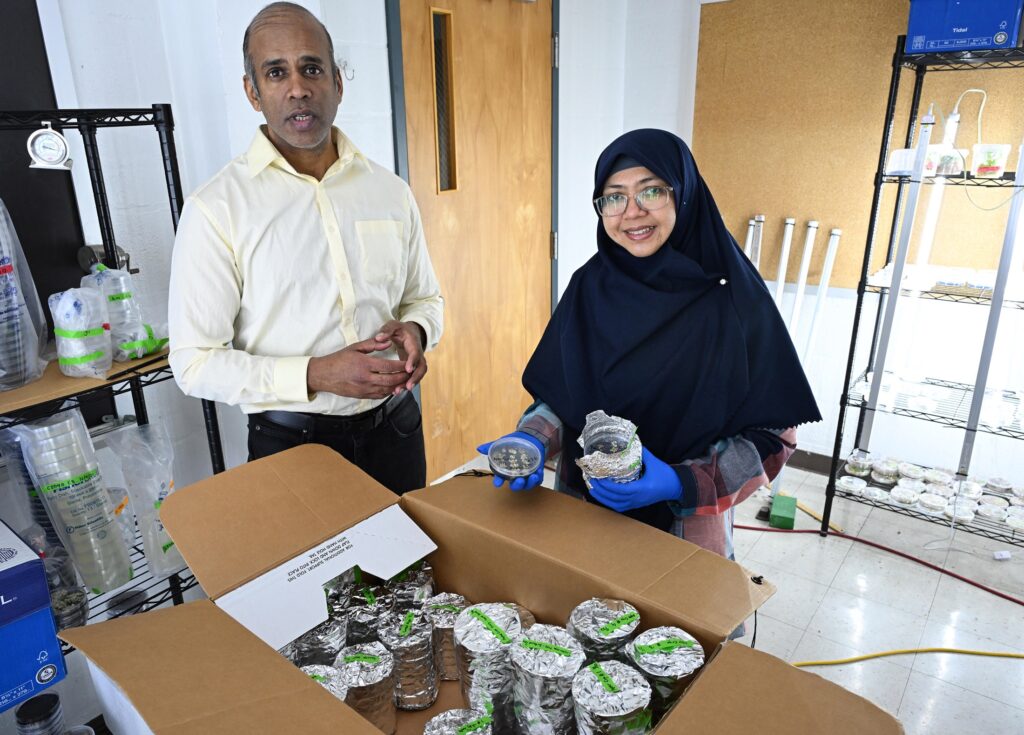
The caliber of research taking place in labs across the University of Maryland Eastern Shore attracts not only the attention of potential undergraduate and graduate students but international faculty as well. When Indonesian researcher Dr. Dini Hervani (far right) came across journal articles on cryopreservation and genetic engineering of papaya by UMES’ Dr. Sadanand Dhekney, she knew he could be the key to helping her perfect her research acumen.
The lecturer at Andalas University contacted Dhekney in 2023 about the possibility of hosting her in his lab to share his 20-year expertise in biotechnology of tropical and subtropical fruits research. This September, with Dhekney’s assistance on her research proposal, Hervani’s plan came to fruition when she arrived at UMES as a Fulbright visiting scholar.
During the course of her scientific visit, Hervani is being trained in genetic improvement of papaya, including the establishment of in vitro cultures, and the development of cryopreservation and genetic transformation protocols.
“It has been a rewarding experience conducting research with Dr. Dhekney and being introduced to the work culture in the United States,” Hervani said.
The hours have been long and the work intense, she said, but well worth the valuable experience gained. Hervani has learned to develop various cryoprotectant solutions that will ensure the survival of papaya tissue cultures in liquid nitrogen (-196C) and their successful regeneration into plants after thawing and regrowth.
“Papaya production worldwide is limited by several pathogens, especially viruses, which severely reduce crop yield and quality. Utilizing tissue culture techniques, such as cryopreservation and genetic engineering, can assist in virus management, germplasm conservation and sustainable crop production,” said Dhekney, a professor of plant breeding and biotechnology.
Papaya is an important commercial crop in Indonesia, as the country is a leader in the production and export of the tropical fruit. The industry has been declining in Indonesia due to incidents of pests and diseases, Hervani said.

“My research in Indonesia has focused on the development of in vitro culture protocols for conservation of papaya seed germplasm. The crop is a difficult one to conduct tissue culture work, which restricts its applications for genetic improvement and long-term germplasm conservation. I was interested in coming to UMES to receive training and improve my skills in papaya tissue culture techniques.”
Tissue culture work is complex, detail-oriented and involves multiple steps, Hervani said.
“Dr. Dhekney spent a lot of time in the lab teaching me techniques in the correct way to be successful. This helped me identify mistakes and overcome the obstacles I faced during my research in Indonesia,” Hervani said.
On her return to Indonesia at the end of February, Hervani plans to use the knowledge she gained at UMES to continue her research and train students at her home university, along with publishing her work.
Gail Stephens, agricultural communications, University of Maryland Eastern Shore, School of Agricultural and Natural Sciences, UMES Extension, gcstephens@umes.edu, 410-621-3850.
Photos by Todd Dudek, agricultural communications, University of Maryland Eastern Shore, School of Agricultural and Natural Sciences, UMES Extension, tdudek@umes.edu.
Above, right: Dr. Dini Hervani transfers cryoprotectant solutions to vials containing papaya embryogenic cultures.
Clockwise, below:
UMES professor of plant breeding and biotechnology Sadanand Dhekney and visiting Fulbright Scholar Dr. Dini Hervani work in the lab.
Cryoprotectant solutions used for cryopreservation experiments.
Hervani transfers vials containing cryopreservation treatments to liquid nitrogen.
Papaya embryogenic cultures used for cryopreservation experiments.
Hervani records regrowth of embryogenic cultures under a dissecting stereomicroscopes after storage in liquid nitrogen.






